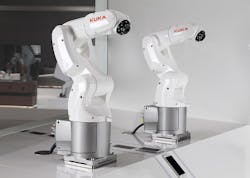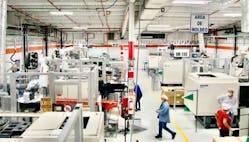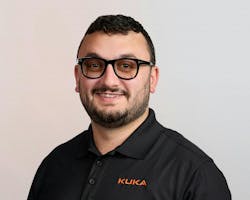While speed to market is important for any personal products manufacturer, it’s especially critical for those companies supplying the packaging. This especially holds true in the cosmetics and skin care industry where innovation and quick response to fashion trends depends on how fast packaging is designed and produced. Manufacturers of cosmetics and skin care products are also seeking cost-efficient and eco-friendly packaging solutions.
For the Albéa Group, a producer of plastic beauty and personal care product packaging, automation has proven to be key to meeting its goals of increased production speed and maintaining the sustainability of its manufacturing operations.
Headquartered in France with 31 facilities worldwide, the Albéa Group generates more than $1 billion in revenue yearly. The company’s product portfolio covers multiple market segments, creating and manufacturing responsible packaging including tubes, lipsticks, mascaras, fragrance caps, skincare jars and turnkey systems for cosmetics providers such as L’Oréal, Estee Lauder, Coty, Shiseido, Tom Ford, La Mer, Kielh’s, Revlon and Avon.
Modern packaging must feature striking visual designs and, in many cases, be recyclable and refillable. Albéa offers short lead times that enable large cosmetic brands to keep pace with smaller, agile competitors.
The Albéa facility in Matamoros, Mexico, pumps out about 50 million products a month and has more than 70 robots, all of which are from KUKA. The KUKA robots range from small KR3 540 robots to the large KR150 and KR210 models. These robots are used to move materials into and out of machines and from place to place within the facility, as well as in packaging assembly and decoration.
The six-axis KR 3 R540 robot has a maximum reach of 541 mm and is designed for a rated payload of 2 kg for maximum speed. It also can hand le up to 3 kg maximum payload in certain load center arrangements. The smaller-capacity robots are fast—capable of 167 cycles per minute—making them perfect for applications in packaging and decorating, according to Antonio Rios, head of automation at the Albéa Matamoras plant.
The rated payload of KR210 robots is 210 kg with a maximum reach of 2696 mm. They are mainly used to move heavier payloads during injection molding operations at Albéa.
Combining the capabilities of different robots enables Albéa to complete multiple operations, ranging from molding, component assembly, silk-screen decoration, packaging and palletizing in a continuous sequence without human intervention.
Because flexibility is key to Albea’s ability to respond quickly to changing customer demands, the KUKA robots in the Matamoros plant are not generally set in fixed locations. Instead, they are intended to be disconnected and moved from one application to another in a manner of minutes. To enable this, the robots are mounted on tables that can be rolled from machine to machine and be arranged as needed. This has enabled the plant to launch more than 200 different applications using fewer than 100 robots.
Beyond their straightforward production applications, the robots have also helped Albea produce innovative packaging concepts that cannot be cost-effectively fulfilled by humans alone.
“In these situations, the goal is to use robots to help humans increase production. We are trying to develop the interaction of humans and robots to work together,” Rios said. The KUKA robots’ flexibility and mobility make it easy to involve the robots with human workers because “we are designing applications from zero,” he added.
Pjeter Lulgjuraj is sales and marketing operations manager at KUKA.



